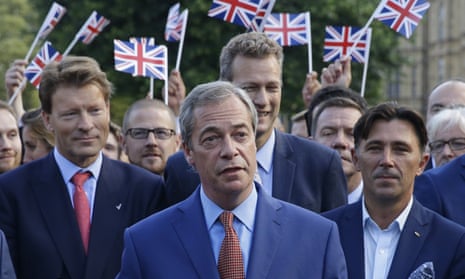On the eve of the vote, as if this were the first act of an Elizabethan drama, a mighty storm thundered over the capital city. It seemed a tempest was raging as the kingdom prepared to decide its fate.
A little more than 24 hours later, we learned of our decision. For some, that has meant jubilation. Witness Nigel Farage’s call for 23 June to become a public holiday: independence day. But for those of us who wanted to remain – the 48%, as we shall now be known – it felt like a bleak midsummer. After the initial numbed shock has come sadness, alarm and, at times, despair.
The economy is part of it. The pound has plunged, the country’s credit rating may be downgraded, and major employers look likely to soon relocate away from post-Brexit Britain – just as the supposed scaremongers of “project fear” warned they would. You look at those graphs, with their cliff-edge drops, and you think: a recession is coming, one we inflicted on ourselves.

The politics are part of it too. When a prime minister resigns, it can be the trigger for a wonderful feeling of catharsis, at least among his – or, famously, her – opponents. But David Cameron’s appearance at the Downing Street podium didn’t feel like an occasion to cheer. Lord knows, he’s to blame for this disaster: too weak to stand up to his own Euro-fanatic right, he instead handed them a referendum for which there had been next to no public clamour. And yet, Cameron fought doggedly for the right result these past few weeks and was gracious about going. We also know who’s coming next: Boris Johnson will surely be in Downing Street by the autumn. How perverse that, thanks to a plebiscite about ending unelected power in Brussels, we shall have an unelected ruler in Westminster.
And we saw who applauded and who wept. Our friends in Paris, Berlin and Washington were stunned and disappointed. Cheering were the French Front National leader Marine Le Pen, far-right Dutch MP Geert Wilders, the Austrian far-rightist Norbert Hofer and, of course, Donald Trump – fittingly the first international visitor to this new land of Ukipania. And no doubt allowing himself a lupine grin, far away from the cameras, was one Vladimir Putin.
As if to deepen the despair, we know now that the United Kingdom is set to unravel – just as we alleged doom-merchants warned it would. Nicola Sturgeon has set in train the process for a second Scottish independence referendum – and who can blame her? Scotland voted to remain in the EU and is about to be dragged out against its will. It makes perfect sense for the Scots to break free of Farage’s UK to stay in the EU. The SNP will have its referendum and it will win it.
There might be a ballot in Northern Ireland too. Pretty soon it may only be England and Wales left: we are becoming little Britain.
But it is not only in the physical sense that our country feels diminished. Somehow the horizons have got smaller. Four years ago, in that unforgettable Olympic opening ceremony, London welcomed the world. It presented itself as a truly global city, perhaps the greatest one – and the whole country revelled in that open-armed gesture to the world. Britain’s biggest cities have long felt that way too.
What helped was the belief that these places were linked to something larger, that they were links in a chain that stretched across the channel or the North Sea and on to the continent. The Brexiteers insist that will remain true, that geographically we are not going anywhere. But maps exist in the mind too. And our participation in the common enterprise of the EU these last four decades bound us closer together. Sheffield, Birmingham, Leeds or Bristol may be separated by water from their continental counterparts, but we were all points of light in this shared venture. No longer.
I suspect this is one of many reasons why the young voted so overwhelmingly to remain, a choice in which they were thwarted by the old. The next generation sees Europe less as a source of meddlers, migrant hordes and other monsters of the tabloid imagination, and more as a vista of possibilities, a place beyond these shores where they might work or travel or move freely. And now a barrier has been placed in their way.
So this has felt like a day of despair for the 48%. We look at our economy, our politics and the shape of the realm, we hear Farage’s promise to bring down the entire EU – a structure that has transformed a continent of conflict into a continent of co-operation – and we tremble for the future.
The funny thing is, it’s not just the 48%. There are leave voters who confessed to reporters that they never thought their side would actually win, that their vote had only ever been intended as a protest, presumed to be safe because surely everyone else would vote the other way. The BBC spoke to leavers in Manchester who admitted that they woke up thinking, “What have I done?” A Twitter user came up with a new coinage for this rapid form of buyer’s remorse: Regrexit.
It’s understandable. After all, many were not really offering a settled view about the EU, so much as using the referendum to answer a set of questions not printed on the ballot paper. Just watch the video reports compiled by my colleagues John Harris and John Domokos, and you soon see that, for many Britons – especially those with low incomes – living in rundown English towns that were left behind decades ago, the questions on their mind were more concrete and direct: are you content with the status quo? Are you comfortable with immigration? Do you feel you have anything to lose? If the answer was no to any or all of those questions, then leave was the box to cross.
And already it’s become clear that the verdict they delivered will not answer the questions they want answered. Note the outrage as Farage greeted the sunrise by announcing that it had been a “mistake” to suggest £350m a week could now be spent on the NHS and that, in fact, no such funds would be available. When some of those leave voters see that Brexit has not brought back the good jobs of old, that housing is still in desperately short supply and that a migrant family still lives round the corner, the Regrexit sentiment will grow.
So what now? There will be negotiations. Johnson seems open to pursuing an arrangement that gives Britain much of what it values, perhaps an “associate membership” of the EU. But the first signals from Europe’s leaders are not encouraging. They want Britain gone, lest it spread its secessionist contagion to others.
And yet, the regret that is palpable the morning after the storm will not dissipate soon. It will grow, as Britons contemplate all that they once cherished and which is now about to disappear, as if swept away in a summer tempest.

